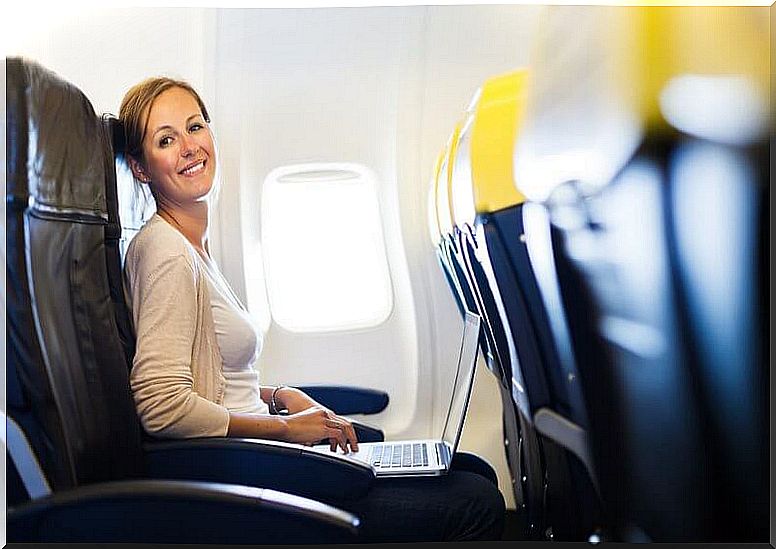Phobia Of Flying: How To Treat It?
We can try to overcome our fear of flying by learning how airplanes work, since in this way we will be aware that most noise and movement is normal.

Aerophobia is the fear of airplanes. It can manifest in different ways, although in most cases it involves not being able to travel by plane. So we’ll tell you more about the phobia of flying and how to treat it.
Phobia of flying: symptoms and causes
The fear of traveling by plane is more common than you might think. One in three passengers suffers from aerophobia.
For this reason, there are many airlines that have created courses (many of which are free) in order to be able to cope with the fear of flying and overcome this phobia.
It could be a phobia of flying or some other manifestation, for example, claustrophobia (fear of closed spaces) or acrophobia (fear of heights).
Aerophobia is the most important of all phobias because of its implications.
Many people who are afraid of flying do not go on vacation to faraway destinations (which cannot be reached by road or sea). Others cannot visit family living in another country or advance in their careers since they feel unable to travel for business.
Although air travel is the safest in the world, the problem with people who suffer from the phobia of flying is that they are not reassured when taking off, during the flight and when landing.
In addition, the fact of not having “feet on the ground” generates moreover an increase of the anxiety.
In aerophobia we can differentiate several fears:
- “The plane will fall”
- “I’m going to have a panic attack”
- “I’m going to suffer from claustrophobia”
- “There will be turbulence and strange noises”
- “I won’t be able to escape”
- “They won’t be able to help me if I have a heart attack”
- “I will fly over the water or fly in the middle of the night”
- “I will never be in control of the situation”
Trauma from the past can increase the phobia of stealing.
For example, if an acquaintance or relative died in a plane crash, if the first time you traveled there was a lot of turbulence or you experienced a forced landing, if you saw films of air disasters , etc.
The media can also be a trigger for aerophobia. Information programs often tell us about aircraft accidents with a large number of victims, and present this as a factor that is not isolated.
It’s good to know that more people die from road accidents than from plane crashes around the world.
How to treat the phobia of flying
People who cannot travel to far-flung places, cannot plan a vacation, or cannot progress in their work due to their phobia of flying should seek therapy that may allow them to overcome this fear.
Some methods that can be very useful are:
1. Learn information about airplanes
We don’t need to be a pilot or a flight attendant to know how an airplane works.
You have to learn the operation of the plane at the time of take-off or landing, what happens during the flight, what are the safety measures taken before leaving, what is taken into account during the trip, how many checks must be carried out before take off, etc.
It would also be good to know how the wings work as well as each part of the plane.
The planes are constantly revised and maintained. Before the pilot takes off, everything must be in perfect condition.
In addition, you should know that one hour of flight corresponds to 11 hours of maintenance to ensure that everything is working properly.
2. Compare aviation safety
It is true that when an aircraft accident occurs, most of the occupants die. However, it is less likely to suffer from a plane crash than a car crash.
You can look for statistics to put your mind at ease. Although in the media we can see many cases of plane crashes which are more shocking than usual.
3. Prepare for typical movements
In many cases, the phobia of stealing is based on lack of knowledge.
What happens when there is turbulence, or when the plane takes off, why do they make us buckle up?
When something changes our sense of security, we immediately assume it is because of something bad. However, this is not necessarily the case.
For example, you should know that:
- The ears become blocked (due to the change in air pressure)
- The stomach may feel a sense of emptiness (because you have to go at high speed to take off)
- The wings perform movements (to change direction or to be able to fly when there is wind)
4. Don’t worry about turbulence
While you might think this is the worst part of the trip, it’s actually something very common.
- Especially if you take a long trip, i.e. a trip of more than 6 hours, at some point the plane will move a little more.
- This occurs when the aircraft passes through an area of low pressure followed by an area of high pressure. It would be like driving on a path with stones or with holes.
- Passengers are asked to buckle up for safety, nothing more.
5. Manage anxiety
You have to remember that no matter how nervous or scared you are, theft is not up to you. This means that you won’t have to worry about something that is “out of your control”.
You can practice relaxation or breathing exercises before take off or even during the trip.
Imagine where you will go, the places you will meet, the people you will see when you arrive. Watch movies, read a book, listen to music, do sodoku, or talk to the person next to you.
That way, you won’t pay as much attention to what’s going on around you.
Stress, anxiety and fear are the great adversaries in today’s society. We have an immediate connection with everything that is going on . To try and calm our brains down, there are certain rules that we can all follow.









